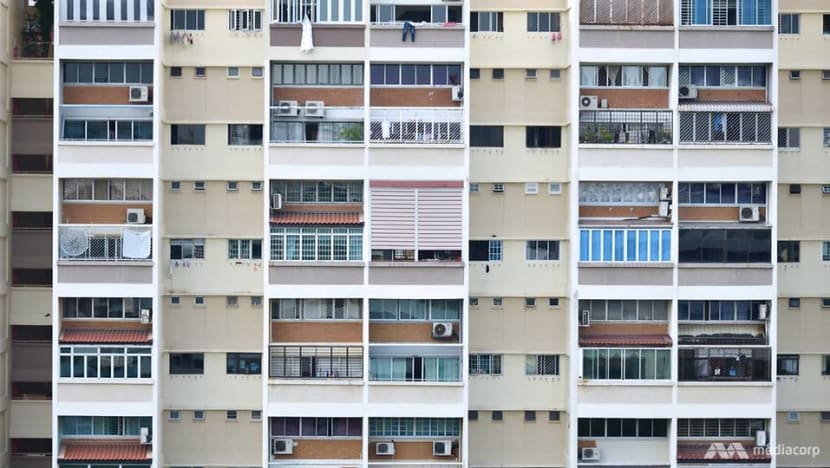Some fully vaccinated COVID-19 patients with mild or no symptoms to be isolated at home under MOH pilot

An HDB block in Singapore (File photo: Gaya Chandramohan)
SINGAPORE: Some fully vaccinated COVID-19 patients who have mild or no symptoms will be able to recover at home from Aug 30, as part of a pilot scheme by the Ministry of Health (MOH).
MOH said on Thursday (Aug 19) that these patients need to have a “suitable” home setting, where they can be isolated from the rest of their household.
The patients and their household members must be fully vaccinated and must not belong to any vulnerable groups, such as the elderly or immunocompromised, the Health Ministry added.
The COVID-19 cases will spend the "first few days" in a medical facility, before moving to home isolation.
"By then, the viral loads of vaccinated patients would have dropped," said MOH.
Speaking at a COVID-19 multi-ministerial task force press conference, MOH director of medical services Associate Professor Kenneth Mak said that only fully vaccinated cases who are either asymptomatic or have mild symptoms are eligible for this pilot.
They must also be assessed to be unlikely to deteriorate or require hospital-based care during the illness, he said, adding that patients will be selected for home isolation after an initial period of monitoring and evaluation in a hospital or a community care facility.
“The infected person must self isolate in a room, which has an ensuite bathroom, or must stay alone at home,” he said.
“This is so that others are not exposed to infection by sharing common facilities at home, and there's then no risk of infection spreading to neighbours.”
The infected person will not be allowed to leave his or her home, except for the purpose of a medical review with the approval of MOH, he added.
COVID-19 patients on home isolation will need to wear electronic tracking devices, while surveillance checks through phone calls will also be done to ensure they remain at home.
All household members will come under home quarantine, and will be placed on a daily antigen rapid test (ART) regimen for "early detection of potential infection".
"The patients will be closely monitored for their health and safety during this time and will be provided with access to 24/7 telemedicine services,” MOH said.
These COVID-19 patients will also be subject to a polymerase chain reaction (PCR) swab on the ninth day of illness to determine if they can be discharged from isolation, the Health Ministry added.
The patients will have to be isolated for "at least 14 days" from the start of his illness, Assoc Prof Mak added.
If the PCR test shows the presence of the coronavirus at high loads - suggesting the patient remains infectious - they will be required to continue isolating at home for at least another seven days.
"We have a lot of trust that those who we recruit on to the pilot will understand – we will be educating and properly explain to them – what is required and why it's important for them to follow rules. And we have a high degree of trust and confidence that they will indeed do the right thing," he added.
HOME ISOLATION IN LINE WITH WHO RECOMMENDATIONS
As of Tuesday, 77 per cent of Singapore's population has completed the full vaccination regimen or received two doses of a COVID-19 vaccine.
In the same press conference, Health Minister Ong Ye Kung said that more than 98 per cent of fully vaccinated COVID-19 patients displayed no symptoms or mild symptoms.
Home isolation is "not a new concept", said Mr Ong, citing countries such as Australia, Canada and the United Kingdom as having a similar scheme.
"If we want to live with COVID-19 as an endemic disease, this is a crucial step to take,” he added.
"We will further free up hospital capacity, enable our healthcare system to revert to peacetime operation, and attend to the healthcare needs of our population."
MOH said that there is "much more" local and global data showing that fully vaccinated COVID-19 patients have a “much lower risk of developing severe disease”.
"The WHO (World Health Organization) has also endorsed this approach in its guidelines on the management of COVID-19 infection," said Assoc Prof Mak about the home isolation pilot.
"We are adopting a risk calibrated and phased approach in implementing this pilot with the intent to ensure safe and effective isolation of COVID-19 infected individuals, while preserving the safety of household members, neighbours and the community."
Singapore moved into the second step of the easing of COVID-19 measures on Thursday. This includes allowing up to 50 per cent of employees who can work from home return to the workplace, and bigger attendance for live events and religious services.
BOOKMARK THIS: Our comprehensive coverage of the COVID-19 pandemic and its developments
Download our app or subscribe to our Telegram channel for the latest updates on the coronavirus pandemic: https://cna.asia/telegram

















